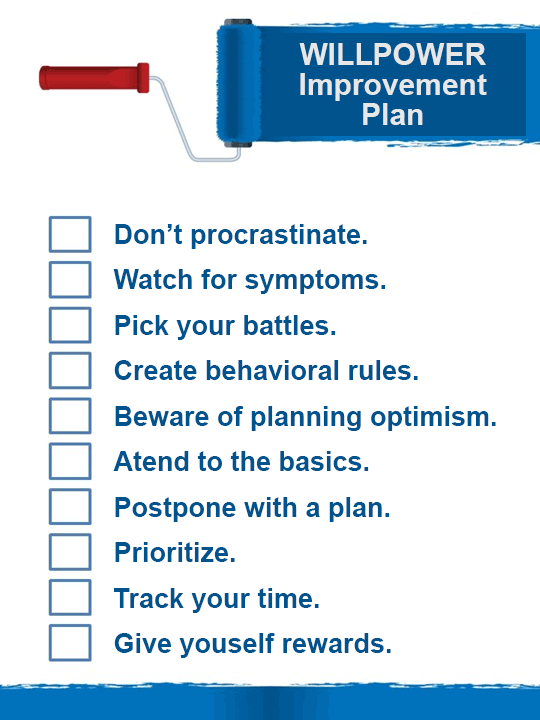Having discussed Baumeister and Tierney’s findings on self-control, I now turn to proven strategies to win the game of willpower. The short answer: Structure your life such that you minimize temptation and inner conflict. In other words, avoid situations that will drain this finite resource. Here are their recommended strategies:
 Don’t procrastinate. When you put off a difficult task or give in to boredom over a mundane task, you are more likely to substitute an activity with the potential for immediate gratification – e.g., raiding the refrigerator. Procrastinators tend to perform worse and exhibit poorer health outcomes than doers while still (eventually) having to get the dreaded job done.
Don’t procrastinate. When you put off a difficult task or give in to boredom over a mundane task, you are more likely to substitute an activity with the potential for immediate gratification – e.g., raiding the refrigerator. Procrastinators tend to perform worse and exhibit poorer health outcomes than doers while still (eventually) having to get the dreaded job done.
Watch for symptoms of ebbing willpower. Are you feeling increasingly agitated? Are you anxious about making decisions? Are you uncharacteristically making mistakes? Do you snap at others? If yes to any of these questions, push the pause button. Relax and breathe deeply. Get healthy food in your body. Then get back to whatever you were doing.
Pick your battles. Set aside a day each year to reflect on your life and create a rough 5-year plan with monthly goals. Then plan to make important changes during periods with relatively low demand on your internal resources. Huge, quick, ill-timed attempts at transformation tend to backfire. Instead, budget your willpower and use it wisely.
Create rules that dictate what you will (and won’t) do – e.g., “I will exercise every morning right when I get out of bed.” “I won’t have more than 2 glasses of wine during the course of an extended dinner party.” Once you’ve made these decisions and take action on them, you won’t waste brainpower on them. They’ll become automatic mental processes.
Beware of planning optimism. Human beings consistently underestimate the amount of time and effort it takes to complete a project. Set realistic expectations by using your history as a guide and/or getting input from others who’ve gone before you. Try to chunk big projects into small pieces and set priorities for how you’ll proceed.
Attend to the basics – diet, exercise, sleep, hygiene. A healthy, rested will is a strong will. An orderly environment creates a well-disciplined mind. Cultivate good habits and get rid of bad ones. Habits are strengthened by routine.
Postpone with a plan. If you really can’t motivate yourself to tackle a must-do project but can’t stop thinking about it, set it up as the #1 thing on the following day’s to-do list. Add pleasurable tasks as items 2, 3, 4… as incentives to knock out the top priority. This strategy frees the mind to do something else in the present moment while providing assurance that the task is not left unattended.
Set aside time daily to attend to your most important priorities. Do not allow for alternate activities to intrude upon that time. Scheduled time prepares the mind to focus on that activity and stops the internal debate about competing uses of time.
Track your time. The more carefully you monitor your time, the better you’ll get at using it wisely. (There are lots of tools to help you do it!)
Give yourself rewards. Acknowledge your accomplishments and the willpower necessary to achieve them. Use little rewards for little things, and big rewards for big things.